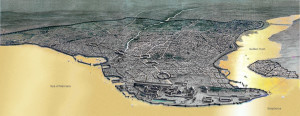It seems but a poor result of the conquest of Constantinople by the Latins that all which came of it was the transference of relics from the East to the West — nothing else.
Continuing Crusader Empire Rules Constantinople ,
our selection from Constantinople by William J. Brodribb and by Sir Walter Besant published in 1879. The selection is presented in six installments for 5 minute daily reading. For works benefiting from the latest research see the “More information” section at the bottom of these pages.
Previously in Latin Empire Of The East – Its Foundation And Fall (A.D. 1204-1261).
Time: 1204-1261
Place: Constantinople

Public Domain Image from Wikipedia.
This kind of traffic once begun, and proving profitable, there was no reason why it should not continue. Accordingly, the Crown of Thorns was followed by a large and very authentic piece of the true Cross. St. Louis gave Baldwin twenty thousand marks as an honorarium for the gift of this treasure, which he deposited in the Sainte-Chapelle. Here it remained, occasionally working miracles, as every bit of the true Cross was bound to do, until the troubles of the league, when it was mysteriously stolen. Most likely some Huguenot laid hands upon it, and took the same kind of delight in burning it that he took in throwing the consecrated wafer to the pigs.
And then more relics were found and disposed of. There was the baby linen of our Lord; there was the lance which pierced his side; there was the sponge with which they gave him to drink; there was the chain with which his hands had been fettered: all these things, priceless, inestimable, wonder-working, Baldwin sent to Paris in exchange for marks of silver. And then there were relics of less holiness, but still commanding the respect and adoration of Christians; these also were hunted up and sent. Among them were the rod of Moses, and a portion — alas! a portion only — of the skull of John the Baptist. Thirty or forty thousand marks for all these treasures! And it seems but a poor result of the conquest of Constantinople by the Latins that all which came of it was the transference of relics from the East to the West — nothing else. Such order as the later Greek emperors had preserved, changed into anarchy and misrule; such commerce as naturally flowed from Asia into the Golden Horn, diverted and lost; a strange religion imposed upon an unwilling people; the break-up of the old Roman forms; the destruction by fire of a third of the city; the disappearance of the ancient Byzantine families; the ruin of the wealthy, the depression of the middle classes; the impoverishment of the already poor; the decay and loss of learning: these were the things which the craft and subtlety of Dandolo, working on the Franks’ lust of conquest, had brought about for the proud city of the East.
But the end was drawing daily nearer. Vatatces of Nicæa died. He was succeeded by his son Theodore, on whose death the crown of Nicæa devolved upon an infant. The child was speedily, though not immediately, openly dethroned by the regent, Michael Palæologus. When at length the imperial title was assumed by the latter, Baldwin thought it advisable to attempt negotiations with him. His ambassadors were received with open contumely; Michael would give the Latins nothing. “Tell your master,” he said, “that if he be desirous of peace, he must pay me, as an annual tribute, the sum which he receives from the trade and customs of Constantinople. On these terms I may allow him to reign; if he refuses, it will be war.”
That was in the year 1259. Michael, no putter-forth of empty and boastful words, prepared immediately for the coming war; so in his feeble way did Baldwin, but his money was spent, his recruits were melting away, the Venetians alone were his allies, and the Genoese had joined the Greeks. And yet Michael did not know — so great was the terror of the Frank and Flemish name which the great Baldwin, Henry of Flanders, and John de Brienne had left behind them — how weak was the Latin empire; how unstable were the defences of the city.
Michael, in 1260, marched into Thrace, strengthened the garrisons, and expelled the Latins yet remaining in the country. Had he, the same year, marched upon Constantinople, the city would have been his. But the glory of taking it was destined for one of his generals.
The Greek Emperor, returning to Nicaea, sent Alexius Strategopoulos, his most trusted general, on whom he had conferred the title of caesar, to take the command of his armies in Europe. He laid strict orders upon him to enter the Latin territory as soon as the existing truce was concluded: to watch, report — act upon the defensive if necessary — but nothing more.
| <—Previous | Master List | Next—> |
More information here and here, and below.
 |
We want to take this site to the next level but we need money to do that. Please contribute directly by signing up at https://www.patreon.com/history
Leave a Reply
You must be logged in to post a comment.